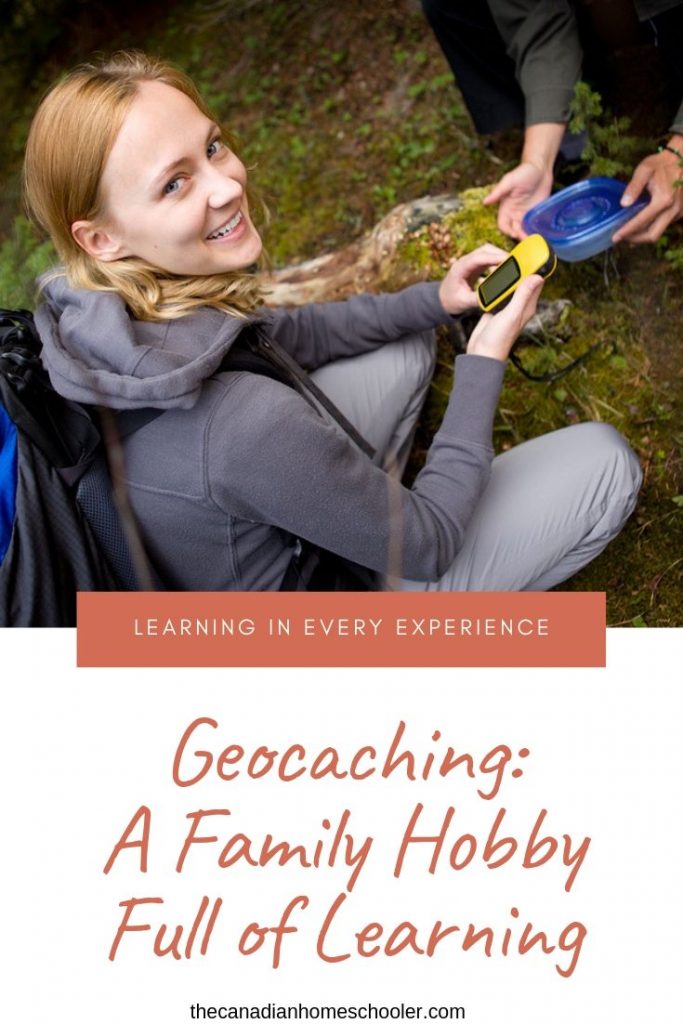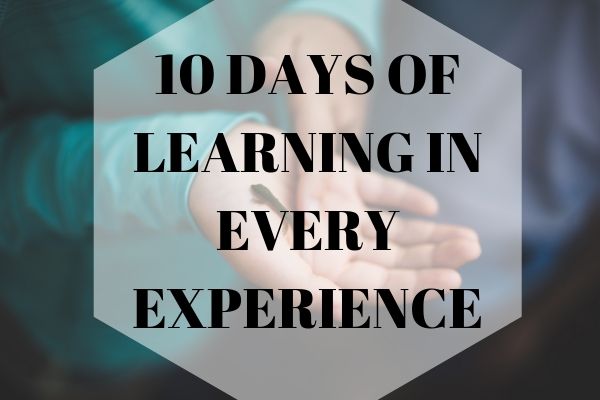Geocaching has been cheekily defined as “using multi-million dollar satellites to find Tupperware in the woods.” It’s not wrong. This great family activity is based on people hiding camouflaged containers, called caches, somewhere outside and then adding the GPS coordinates to a website for other people to hunt and find.

There are some really unique caches, too. We’ve found some stuck on lamp posts and dangled down drains. I’ve seen pictures of caches hidden underwater for scuba divers, one where you have to jump a few feet across a hundred-foot deep gap, and there is even one at the top of Mount Everest! Sometimes people make them extra tricky to find – imagine a pile of what you think it dog poo only to find out it’s the hiding spot!
When you find a hidden cache, you record your find on the website and/or in a log inside the container. Sometimes you can take a treasure from inside, too, if you leave one in return.
You can get a special GPS unit and download all the coordinates to it, or you can use the geocaching app on a smartphone and it will turn into a GPS for you.
The website geocaching.com is where you can get a list of caches anywhere in the world, the coordinates to find them, and create an account to keep track of all your finds.
Why Homeschoolers Should Go Geocaching
Geocaching allows your family to learn many skills, just by searching for containers together.
- It gets you outside in nature, being active together.
One of the biggest perks of doing geocaching is that you have to go outside to do it. It can be easy to just stick with regular routines and spaces, but this hobby takes your family out and about, often to new and different locations that you might not have checked out before. Our family has used geocaching to explore new community playgrounds, check out landmarks in our local area, and go on hikes through various parks and trails. It’s a good way to get some physical fitness as a family.
Geocaching often leads to some of the most beautiful places and gives you a chance to intentionally admire the nature that surrounds us. You can study the trees and flowers you go past. You can learn to identify things like poison ivy. You can teach your children the importance of staying on the trail and leaving no trace behind. Kids are often tempted to pick flowers or move stones or wander through the woods. This is a great chance to explain why not.
Also, you can use this to teach things like how to look for ticks and other post-hike skills.
- It hones the power of observation and the art of patience.
For kids who are prone to quick scanning for things instead of taking their time, geocaching is a great skill builder for patience and observation. GPS co-ordinates don’t usually bring you to the exact location of a cache, but generally, triangulate the position. As soon as you have a basic area, you need to start searching.
Caches are deviously camouflaged or tucked away somewhere. You have to be willing to search – up, under, behind, inside. You have to use slow eagle-eyes for anything out of the ordinary. Once you’ve done a few caches, you start to see common hiding spots, which can really help you get better at searching.
It’s tricky and can really involve a huge amount of patience when you really just want to find it! This has been a great activity for my active kids who would rather up and go to the next one when they can’t instantly find a container.

- It involves math, geography, and logic skills.
In order to find a cache to hunt, you will need to go to the website and find your location on a map. This is the first step and requires your children (if they are the ones helping you plan) to know where they are in the world.
GPS coordinates are longitude and latitude markers for locations, which is an important skill to understand where you are in the world. Geocaching is a great way to understand how these lines divide up the globe into sections. Plus, using a GPS to find your location involves paying attention to distances – whether that be feet or metres – and noticing when the arrow changes directions so you can narrow down the location. These steps all involve math and geography skills.
One other neat feature about the website is that if you get stuck while searching, many of the cache postings have clues to help. These clues, however, are written in secret code that you have to decipher. (You can just skip the cypher if you are in a rush, but it adds to the challenge!) Some caches are actually puzzles in themselves – meaning that the coordinates you get to find a container actually just give you a clue to the next location. Like a mini-scavenger hunt!
There are actually things called EarthCaches where the cache is the actual location. They are designed to be educational locations that teach something about earth sciences.
- TeamWork & Communication are vital.
Since this is an activity that involves a lot of coordination and logistics, it’s of vital importance to be able to work together as a team to find the location and the actual cache itself. Being able to communicate effectively is key. How much farther do you need to walk? In which direction? How is the ground you are walking on – muddy? Are you in the general area? What size is the container on the listing? Are there any clues that you need to pay attention to in the description (or in the hint if needed)? Where is everyone going to look? Did you find it? So many opportunities to be a great team and learn the skill of sharing information with each other.
- There are plenty of other things you can build from this.
Another side part of this is that you can teach kids important things like what you should bring with you when you go out exploring in nature – first aid kit, water and snacks, etc. – as well as how to handle any emergencies that you face while exploring. You can do it in just about any town too – which means it is an easy activity to do anywhere, even if you are on vacation or visiting relatives and need something to kill some time – allowing you the opportunity to learn more about different places.
- It’s just plain fun.
I mean, what kid doesn’t love treasure hunting. The thrill of the search is almost as much fun as the rush of finding it. Kids love this game and best of all – it’s free! (Unless you decide to get better equipment or membership for more listings.)
If you want to find out more about geocaching, visit GeoCaching.com for a free membership.
SOME OTHER IDEAS
Like geocaching, but want to try something different? Why not try one of these other options:
- Letterboxing – This is similar to geocaching in that you search for hidden boxes, but instead of just adding your name to the log or dropping in a treasure, they contain rubber stamps that you can then add to your own stamp book. You can find out more about it at https://www.letterboxing.org/GettingStarted/getstart_finding.htm
- Find a Grave – People who love to study their family ancestry often want to find the gravestones of people in their family’s past for more information or to help with their records. FindAGrave.com offers the opportunity for people to request a photo of a tombstone. You can find photo requests that are close to you and go exploring through local cemeteries to find the requested grave and take a picture of it for the website. This is a really neat way to discover some of the local history as well as an opportunity to teach your kids your own ancestry, how to respect the dead, etc alongside the challenge of finding specific stones in the cemetery. You can find out more about it at https://www.findagrave.com/
This post is part of a 10 day series all about learning through every experience. Join me as we look at different ways kids learn outside of a textbook and workbook – just by experiencing life.
- How to Keep a Toddler Busy While Homeschooling - March 21, 2024
- 25+ Things Your Kids Learn From Video Games - March 20, 2024
- 10 Words For New Homeschoolers - March 20, 2024


i have a friend who geocaches all the time. I’ve only been a couple of times but it’s rather fun